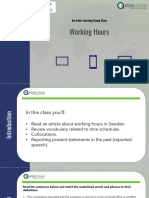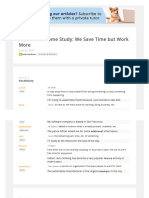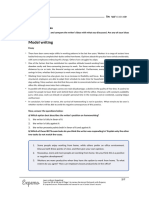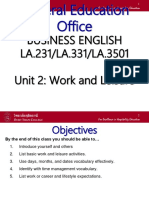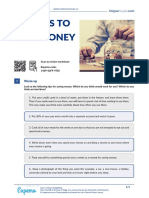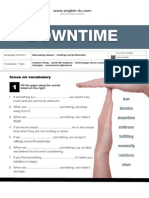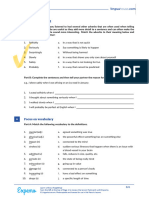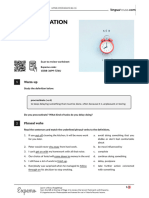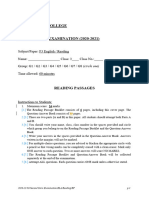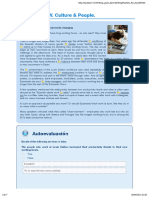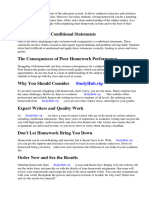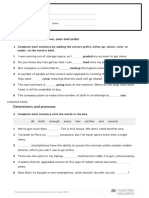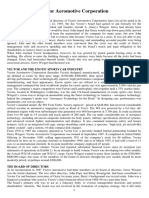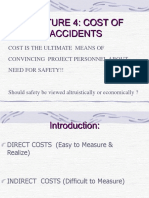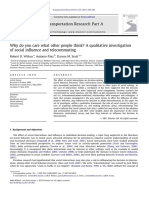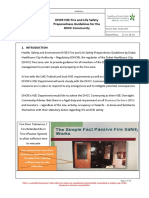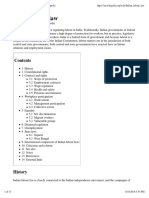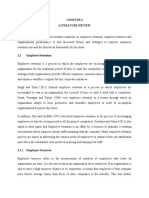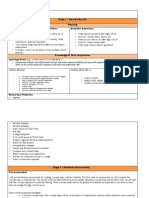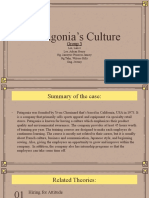Working Hours British English Teacher
Working Hours British English Teacher
Uploaded by
Madalina GorganCopyright:
Available Formats
Working Hours British English Teacher
Working Hours British English Teacher
Uploaded by
Madalina GorganOriginal Title
Copyright
Available Formats
Share this document
Did you find this document useful?
Is this content inappropriate?
Copyright:
Available Formats
Working Hours British English Teacher
Working Hours British English Teacher
Uploaded by
Madalina GorganCopyright:
Available Formats
HEAAADERLOGORIGHT
BUSINESS ENGLISH · BUSINESS ISSUES · PRE-INTERMEDIATE (A2-B1)
WORKING
HOURS
QrrkoD Scan to review worksheet
Expemo code:
1B1S-H7KE-M55F
1 Key words
Read the sentences below and match the underlined words and phrases to their definitions.
1. The newspaper reported that the company is going to move its head office to another country.
2. The staff were very happy, so the company had a low turnover.
3. Jane is not at work this month. She’s on leave.
4. A company laptop is an important perk of this job.
5. We need to increase productivity. Workers are getting very lazy.
a. a benefit, such as money or a car, that you are given because of your job
b. a period of time when you do not go to work
c. describe on television, radio, or in a newspaper
d. how fast a company makes things
e. the rate at which employees leave a company and are replaced by new people
FOOOOTERRIGHT Learn without forgetting! 1/6
Scan the QR at the top of Page 1 to review the lesson flashcards with Expemo.
© Linguahouse.com. Photocopiable and licensed for use in Madalina Ungureanu's lessons.
HEAAADERLOGORIGHT
PRE-INTERMEDIATE (A2-B1)
WORKING HOURS
2 Find the information
You are going to read an article about Sweden’s flexible working hours. Guess the answers to the
questions below and then read the text to check them.
1. When was the six-hour work day first implemented in Sweden?
a. 2 years ago b. 5 years ago c. over 10 years ago
2. How many holiday days do Swedes get every year?
a. 15 b. 25 c. 45
3. How many days of leave do Swedes get after having a baby or adopting a child?
a. 120 b. 240 c. 480
4. How many Swedes work more than 50 hours a week?
a. 1 percent b. 6 percent c. 11 percent
5. How many Americans work more than 50 hours a week?
a. 1 percent b. 6 percent c. 11 percent
FOOOOTERLEFT Learn without forgetting! 2/6
Scan the QR at the top of Page 1 to review the lesson flashcards with Expemo.
© Linguahouse.com. Photocopiable and licensed for use in Madalina Ungureanu's lessons.
HEAAADERLOGORIGHT
PRE-INTERMEDIATE (A2-B1)
WORKING HOURS
The truth about Sweden’s six-hour work day
Only 1 percent of Swedes work more than 50 hours a week
1.
In 2015, newspapers reported that Sweden was moving to a six-hour work day.
2.
Employers at a Toyota centre in Gothenburg, Sweden’s second largest city, said that staff were happier, the
company had a lower turnover and profits were higher after it implemented the shorter working hours over 10
years ago.
3.
Good results caused a number of other Swedish companies to try cutting hours, and then suddenly, everybody
was talking about it on the internet.
4.
But Indeed.com, the biggest Swedish job site, revealed that Sweden’s six hour day might not be as revolutionary
as it sounds. According to the website, there are zero searches for "six-hour workday" or "short work week" in
Sweden, and no jobs are actively promoting the short six-hour day in their job adverts.
5.
Tara Sinclair, chief economist for Indeed, said the results don’t mean Sweden’s six-hour workday is myth. "It’s more
likely a sign that Swedes are already used to a healthy work-life balance. So the topic isn’t that shocking to them,"
Sinclair said.
6.
Swedes get 25 holiday days a year and parents can have 480 days of leave after they have a baby or adopt.
7.
Only 1 percent of Swedes work more than 50 hours a week, compared to the US average of 11 percent. That
means 144 hours less work a year for the average Swede than the average American.
8.
Meanwhile, the number of job adverts with "flexible working arrangements" has stayed the same over the past
two years, while the number of searches for these terms is actually lower. In the US, the number of searches for
flexible working goes up every year. "Flexibility is no longer a new perk but an expected part of any job," Sinclair
said.
9.
Longer working hours have been linked with heart disease and stroke, according to a medical study.
10.
The companies that implemented six hour days last year have not released any results that show the effect on
productivity. But psychologists warned that shorter working days could put extra pressure on workers to do more
work in less time.
11.
"The risk is that people may work more intensively and try to do more work in a shorter period of time. This would
increase pressure, not reduce it," said Gail Kinman, a professor of occupational psychology.
Adapted from The Independent, by Hazel Sheffield, 7 January 2016
3 Checking understanding
Answer the questions below.
1. What were the benefits of a shorter work day at Toyota?
2. Why is the six-hour work day not a big deal in Sweden?
3. What is the difference between Sweden and the United States when people are looking for flexible
work opportunities on the internet?
4. What are the drawbacks of a longer work day?
5. What are the drawbacks of a shorter work day?
FOOOOTERRIGHT Learn without forgetting! 3/6
Scan the QR at the top of Page 1 to review the lesson flashcards with Expemo.
© Linguahouse.com. Photocopiable and licensed for use in Madalina Ungureanu's lessons.
HEAAADERLOGORIGHT
PRE-INTERMEDIATE (A2-B1)
WORKING HOURS
4 Collocations
Match the verbs on the left to the words on the right to form phrases from the text.
1. cut a. a baby
2. have b. hours
3. put c. more work
4. do d. pressure (on somebody)
5. stay e. the same
For each phrase, make up your own sentence.
1.
...............................................................................................
2.
...............................................................................................
3.
...............................................................................................
4.
...............................................................................................
5.
...............................................................................................
5 Talking point
Discuss any of the questions below.
1. Is there a flexible working culture in your country?
2. Would you like to work six hours a day?
3. Do you think this system could work in your country?
6 Grammar - Reporting present statements in the past
There are two ways of saying what another person said in the past – direct speech and reported
speech. Study the table on the next page.
FOOOOTERLEFT Learn without forgetting! 4/6
Scan the QR at the top of Page 1 to review the lesson flashcards with Expemo.
© Linguahouse.com. Photocopiable and licensed for use in Madalina Ungureanu's lessons.
HEAAADERLOGORIGHT
PRE-INTERMEDIATE (A2-B1)
WORKING HOURS
Direct speech Reported speech
Direct speech repeats the exact words that Reported speech reports what
somebody said or wrote: somebody said without repeating
Newspapers wrote, "Sweden is moving to a the exact words:
six-hour work day." Newspapers reported that Sweden
Tara Sinclair said, "The results don’t mean was moving to a six-hour work day.
Sweden’s six-hour workday is myth." Tara Sinclair said the results don’t
Psychologists warned, "Shorter working mean Sweden’s six-hour workday is
days can put extra pressure on workers to myth.
do more work in less time." Psychologists warned that shorter
working days could put extra
pressure on workers to do more
work in less time.
Read the rules for forming reported speech and give examples from the table.
1. The tense of the verb in direct speech often changes in reported speech.
am/is/are –> was/were present simple –> past simple can –> could
...............................................................................................
...............................................................................................
2. But it is not necessary to change the tense if the reported situation is still true.
Peter said that he was at home. (Maybe he is still at home now. Maybe he isn’t.)
Peter said he is at home. (He is still at home now.)
...............................................................................................
...............................................................................................
3. After the reporting verb (said, warned, reported, etc.), we can use that or nothing.
...............................................................................................
...............................................................................................
Now look at the following statements from the article. Write ‘D’ (Direct speech) or ‘R’ (Reported
speech) next to each statement.
a. It’s more likely a sign that Swedes are already used to a healthy work-life balance. So the topic
isn’t that shocking to them.
b. Employers at a Toyota centre in Gothenburg said that staff were happier, the company had a lower
turnover and profits were higher.
c. Flexibility is no longer a new perk but an expected part of any job.
FOOOOTERRIGHT Learn without forgetting! 5/6
Scan the QR at the top of Page 1 to review the lesson flashcards with Expemo.
© Linguahouse.com. Photocopiable and licensed for use in Madalina Ungureanu's lessons.
HEAAADERLOGORIGHT
PRE-INTERMEDIATE (A2-B1)
WORKING HOURS
Answer the following questions:
1. What tense is used in the reported statement above?
2. Write what the employers said in direct speech:
Employers at a Toyota centre in Gothenburg said, "Staff . . . . . . . . . . . . . . . . . . . . . . . . . . . . . . . . . . . . . . . .
.............................................................................................. "
7 Practice
Complete the sentences. Change the tense.
1. "We often work overtime." — They told me that they often worked overtime.
2. "I can’t speak Russian." — She told me that she Russian.
3. "It’s raining again." — He said it again.
4. "Our new office is great." — They said that their new office great.
5. "I don’t have a lot of work to do." — She said that she a lot of work to do.
6. "I’m going to spend time with my family." — He said he time with his family.
7. "I don’t know where he works." — She said that she where he .
8. "We can’t work flexible hours." — They told me that they flexible hours.
FOOOOTERLEFT Learn without forgetting! 6/6
Scan the QR at the top of Page 1 to review the lesson flashcards with Expemo.
© Linguahouse.com. Photocopiable and licensed for use in Madalina Ungureanu's lessons.
HEAAADERLOGORIGHT
TEACHER MATERIALS · PRE-INTERMEDIATE (A2-B1)
WORKING HOURS
Key
1. Key words
Students can work individually and check in pairs.
1. c 2. e 3. b 4. a 5. d
2. Find the information
Students can work individually and check in pairs.
1. c 2. b 3. c 4. a 5. c
3. Checking understanding
1. happier staff, higher profits (from lower turnover)
2. Swedes are used to it.
3. In the US, the number of searches for flexible working goes up every year, whereas in Sweden it hasn’t changed.
4. It has been linked with heart disease and stroke.
5. It could put extra pressure on workers to do more work in less time.
4. Collocations
Students can work individually and check in pairs.
1. b 2. a 3. d 4. c 5. e
6. Grammar - Reporting present statements in the past
a. D
b. R
c. D
1. past simple
2. Employers at a Toyota centre in Gothenburg said, "Staff are happier, the company has a lower turnover and
profits are higher."
7. Practice
Students can work individually and check in pairs.
2. couldn’t speak
3. was raining
4. was
5. didn’t have
6. was going to spend
7. didn’t know; worked
8. couldn’t work
FOOOOTERAPPENDIXRIGHT
Learn without forgetting! i
Scan the QR at the top of Page 1 to review the lesson flashcards with Expemo.
© Linguahouse.com. Photocopiable and licensed for use in Madalina Ungureanu's lessons.
You might also like
- Working Hours British English StudentDocument6 pagesWorking Hours British English StudentAna Carla VanzettaNo ratings yet
- 21.02 Working Hours WorksheetDocument4 pages21.02 Working Hours WorksheetmajadriankarolNo ratings yet
- Taking A Break British English Teacher Ver2 BWDocument7 pagesTaking A Break British English Teacher Ver2 BWLendvai NikolettNo ratings yet
- A Four Day Workweek American English StudentDocument7 pagesA Four Day Workweek American English StudentMargo FidurskaNo ratings yet
- Taking A Break American English Student Ver2Document6 pagesTaking A Break American English Student Ver2david youngNo ratings yet
- Group Classes Material Advanced OctoberDocument82 pagesGroup Classes Material Advanced OctoberManu EguíluzNo ratings yet
- Taking A Break British English StudentDocument5 pagesTaking A Break British English StudentrajaaNo ratings yet
- The Flexible Work Day British English TeacherDocument11 pagesThe Flexible Work Day British English TeacherKate NikolinaNo ratings yet
- Work From Home Study - We Save Time But Work More - Engoo Daily NewsDocument7 pagesWork From Home Study - We Save Time But Work More - Engoo Daily NewsitsshairadumadagNo ratings yet
- The Flexible Work DayDocument7 pagesThe Flexible Work Daywafaamohmed022No ratings yet
- Work Words British English StudentDocument3 pagesWork Words British English StudentMaja ŚrodaNo ratings yet
- 1920 - S5 1st Term Exam Paper 1 - RPDocument5 pages1920 - S5 1st Term Exam Paper 1 - RP龐蕊兒No ratings yet
- Does A Four Day Work Week Work British English StudentDocument8 pagesDoes A Four Day Work Week Work British English StudentnehitaNo ratings yet
- Helping Employees With Disabilities FlourishDocument7 pagesHelping Employees With Disabilities FlourishMaría Martínez BortNo ratings yet
- The Flexible Work Day British English Student B2 C1Document7 pagesThe Flexible Work Day British English Student B2 C1SzychuNo ratings yet
- Cours de Dissertation Philosophique PDFDocument6 pagesCours de Dissertation Philosophique PDFPaperWritingServiceUK100% (1)
- Prime Time: Einstiegstest Name: Klasse: DatumDocument11 pagesPrime Time: Einstiegstest Name: Klasse: DatumLadyNo ratings yet
- Burnout STK C1 English LessonDocument6 pagesBurnout STK C1 English LessonHsu Lai WadeeNo ratings yet
- Burnout British English TeacherDocument8 pagesBurnout British English TeacherInmaculada Maset VilaNo ratings yet
- Motivation British English StudentDocument7 pagesMotivation British English StudentHarmony LectorNo ratings yet
- 29business English Intermediate Review 5 British English StudentDocument7 pages29business English Intermediate Review 5 British English StudentAgata AwakowiczNo ratings yet
- Burnout and Creativity British English TeacherDocument8 pagesBurnout and Creativity British English TeacherCarlaNo ratings yet
- Work Words British English Student Ver2Document3 pagesWork Words British English Student Ver2Andrea AvilaNo ratings yet
- Homework - Discursive EssayDocument2 pagesHomework - Discursive EssayKatarzyna PośpieszynskaNo ratings yet
- 3 Unit 2 Work and LeisureDocument24 pages3 Unit 2 Work and LeisureEva JiménezNo ratings yet
- Why Some Employees Quit American English Student BWDocument8 pagesWhy Some Employees Quit American English Student BWPat RiciaNo ratings yet
- Worry More Live Longer British English TeacherDocument8 pagesWorry More Live Longer British English TeacherWai Min AungNo ratings yet
- Year 6 Homework GridDocument4 pagesYear 6 Homework Gridh45r84vq100% (1)
- Changing Careers British English Student Ver2Document3 pagesChanging Careers British English Student Ver2Milica KocovicNo ratings yet
- Dogs at Work British English Student Ver2Document5 pagesDogs at Work British English Student Ver2CRISTINANo ratings yet
- Corporate Well Being American English StudentDocument7 pagesCorporate Well Being American English Studentmagdalena.jurkemikovaNo ratings yet
- Mixing Responsibilities British English StudentDocument7 pagesMixing Responsibilities British English Student8w98t7hydbNo ratings yet
- 3 Tricks To Save Money American English TeacherDocument10 pages3 Tricks To Save Money American English TeacherPatricia FreireNo ratings yet
- Work Words British English Teacher Ver2Document4 pagesWork Words British English Teacher Ver2Наталія КовтунNo ratings yet
- Downtime: Ban Dismiss Downtime Embrace Fulfilling Necessity Reinforce ShunDocument3 pagesDowntime: Ban Dismiss Downtime Embrace Fulfilling Necessity Reinforce ShunJane_Doe30No ratings yet
- Living at Work American English Student A2 B1Document4 pagesLiving at Work American English Student A2 B1Alla PetrukNo ratings yet
- Corporate Well Being British English TeacherDocument11 pagesCorporate Well Being British English TeacherOlfa MabroukNo ratings yet
- Procrastination American English TeacherDocument5 pagesProcrastination American English TeacherViktoriaNo ratings yet
- Essay On Importance of Holiday HomeworkDocument4 pagesEssay On Importance of Holiday Homeworkcpgxzuzod100% (1)
- Work Words American English Student Ver2 BWDocument3 pagesWork Words American English Student Ver2 BWmarc leacockNo ratings yet
- Creating Stronger Connections American English StudentDocument5 pagesCreating Stronger Connections American English StudentMira SamNo ratings yet
- Business English Intermediate Review 5 British English StudentDocument7 pagesBusiness English Intermediate Review 5 British English StudentnnovavidanairlandaNo ratings yet
- Corporate Well Being British English StudentDocument7 pagesCorporate Well Being British English StudentJustinSMaNo ratings yet
- Working HoursDocument3 pagesWorking Hourstotal.aneurism149No ratings yet
- S3 - MLP - 20-21 - 2nd - Term - Exam - RP (3rd Draft)Document7 pagesS3 - MLP - 20-21 - 2nd - Term - Exam - RP (3rd Draft)teresaluiwyNo ratings yet
- Is Homework Beneficial EssayDocument8 pagesIs Homework Beneficial Essayersc16mz100% (1)
- IELTS Test Unit 1Document2 pagesIELTS Test Unit 1Romina Paola PiñeyroNo ratings yet
- Anti Work American English TeacherDocument11 pagesAnti Work American English TeacherМарина ИсхаковаNo ratings yet
- Being Self Employed British English StudentDocument7 pagesBeing Self Employed British English Studentface2face.english.courseNo ratings yet
- Ga Ing04 Ci Vi UnidoDocument98 pagesGa Ing04 Ci Vi UnidoKenura666No ratings yet
- La Tarea Homework FullDocument7 pagesLa Tarea Homework Fullafeukeaqn100% (1)
- Homework 2-2 Conditional StatementsDocument6 pagesHomework 2-2 Conditional Statementskvmmzawlf100% (1)
- Test On Unit 8 READY FOR CAE GeneratorDocument2 pagesTest On Unit 8 READY FOR CAE GeneratorrodcruzlantesNo ratings yet
- Planning Ahead American English Student B1 B2Document6 pagesPlanning Ahead American English Student B1 B2Lilian Ayme Morell QuiñonesNo ratings yet
- Fiche Technique Dissertation PhiloDocument6 pagesFiche Technique Dissertation PhiloCheapPaperWritingServicesMobile100% (1)
- Mixing Responsibilities British English StudentDocument7 pagesMixing Responsibilities British English StudentSiriloNo ratings yet
- Last Minute Term PaperDocument6 pagesLast Minute Term Paperc5qj4swh100% (1)
- Holiday Homework Delhi SchoolsDocument8 pagesHoliday Homework Delhi Schoolsafetuieog100% (2)
- Learn & Retain Spanish with Spaced Repetition: 5,000+ Anki Flashcards with Vocabulary, Grammar, & Audio PronunciationFrom EverandLearn & Retain Spanish with Spaced Repetition: 5,000+ Anki Flashcards with Vocabulary, Grammar, & Audio PronunciationNo ratings yet
- CBA101Document22 pagesCBA101ForbesNo ratings yet
- Vector Aeromotive CorporationDocument6 pagesVector Aeromotive Corporationnatalischristian01No ratings yet
- 10 Reliable Workplace Safety RecommendationsDocument6 pages10 Reliable Workplace Safety RecommendationsVICTORNo ratings yet
- FINAL ESRS - S2 - Own Workforce - Working ConditionsDocument20 pagesFINAL ESRS - S2 - Own Workforce - Working ConditionsAbdelmadjid djibrineNo ratings yet
- Lecture 4: Cost of Accidents: Cost Is The Ultimate Means of Convincing Project Personnel About Need For Safety!!Document26 pagesLecture 4: Cost of Accidents: Cost Is The Ultimate Means of Convincing Project Personnel About Need For Safety!!hayelomNo ratings yet
- Why Do You Care What Other People Think A Qualitative Investigation of Social Influence and Telecommuting PDFDocument14 pagesWhy Do You Care What Other People Think A Qualitative Investigation of Social Influence and Telecommuting PDFDARIO JULIAN ARMERO SANTACRUZNo ratings yet
- Republic of The Philippines Position Description Form DBM-CSC Form No. 1Document2 pagesRepublic of The Philippines Position Description Form DBM-CSC Form No. 1Randell Manjarres67% (3)
- Food and Beverage ServiceDocument150 pagesFood and Beverage ServiceRashmi SinghNo ratings yet
- Control DHCR HSE Fire Life Safety Preparedness GuidelinesDocument20 pagesControl DHCR HSE Fire Life Safety Preparedness Guidelinesabdullah amanullahNo ratings yet
- Kitchen Safety Trainer GuideDocument18 pagesKitchen Safety Trainer Guideka1onlineNo ratings yet
- Functions of The Office of The Assistant Labour CommissionersDocument2 pagesFunctions of The Office of The Assistant Labour CommissionersGautamSinghNo ratings yet
- Hacienda Fatima, Et Al. v. National Federation of Sugarcane Workers-Food and General Trade, G.R. No. 149440, Jan. 28, 2003Document8 pagesHacienda Fatima, Et Al. v. National Federation of Sugarcane Workers-Food and General Trade, G.R. No. 149440, Jan. 28, 2003Martin SNo ratings yet
- Indian Labour Law - Wikipedia, The Free EncyclopediaDocument13 pagesIndian Labour Law - Wikipedia, The Free EncyclopediaKailash DhirwaniNo ratings yet
- Jsa For Tie in of Fuel Gas LineDocument3 pagesJsa For Tie in of Fuel Gas LineMohammed Minhaj100% (2)
- Workplace Discrimination, Harassment and Bullying: Good Practice, Good BusinessDocument4 pagesWorkplace Discrimination, Harassment and Bullying: Good Practice, Good BusinessAbhishek GadatiaNo ratings yet
- Accounts Manual 2018Document143 pagesAccounts Manual 2018Senthil MithulNo ratings yet
- Absenteeism Final Project 2Document74 pagesAbsenteeism Final Project 2masook2k10100% (1)
- Fundamentals of Safety ManagementDocument38 pagesFundamentals of Safety ManagementCharlene BorneoNo ratings yet
- CPA - Heleman PresentationDocument10 pagesCPA - Heleman Presentationbee5834No ratings yet
- The Graph Shows The Percentage of Employees Who Work From HomeDocument10 pagesThe Graph Shows The Percentage of Employees Who Work From HomePhalit GuptaNo ratings yet
- Employee TurnoverDocument16 pagesEmployee TurnoverAdekunle Damilola JoshNo ratings yet
- Kuscos Body Scrub Business PlanDocument21 pagesKuscos Body Scrub Business PlanNicole Andrea TuazonNo ratings yet
- 2ND SEM ENTREPRENEURSHIP 4th GRADINGDocument13 pages2ND SEM ENTREPRENEURSHIP 4th GRADINGAnne Clarette MaligayaNo ratings yet
- HR Body of Knowledge-60pgs PDFDocument60 pagesHR Body of Knowledge-60pgs PDFBdv Rao100% (1)
- Answer Template Final Assessment Pad363Document11 pagesAnswer Template Final Assessment Pad363LARRY JONNA LASSY THERENCENo ratings yet
- General Quiz Answers2Document31 pagesGeneral Quiz Answers2srimkbNo ratings yet
- (Lea 5) Police Personnel and Records ManagementDocument9 pages(Lea 5) Police Personnel and Records ManagementZupal Nimajneb68% (19)
- Career Planning Unit Plan (UBD Format)Document12 pagesCareer Planning Unit Plan (UBD Format)Stephanie100% (2)
- Uthman Bin Affan Foundation Academy Inc. Application FormDocument5 pagesUthman Bin Affan Foundation Academy Inc. Application FormShaira MPNo ratings yet
- Patagonia's Culture: Group 3Document14 pagesPatagonia's Culture: Group 3Arcadia SvtNo ratings yet





